Podcast
Our podcast features exclusive interviews, author-narrated essays, fiction, guided practices, and more. We feature new podcast episodes weekly on Tuesdays.
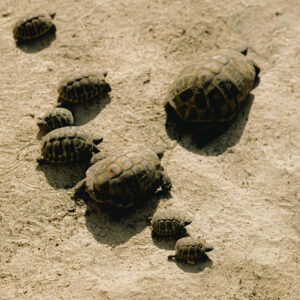
This Week’s Podcast
Tortoise Station
by Lydia Millet
Depicting a distant age in which river guardians, mothmen, and condor trackers strive to protect a dying world, novelist Lydia Millet asks whether we can navigate species loss not through visions of saviors, but through patient devotion to what might yet emerge through care. Amid extreme temperatures and invasive insects, this short story follows a team of caretakers who track, feed, and hatch the clutches of “the old ones”—ancient desert tortoises nearing extinction.
Discover our latest print edition, Volume 6: Seasons.
- 35 min
Most Recent Podcasts
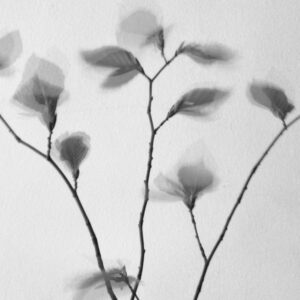
Memory of Winter
Zoë Schlanger
- 29 min
For plants, the moment of spring emergence is the gamble of their lives, says journalist Zoë Schlanger. They rely on a convergence of genetic instructions from within and environmental cues from without to know when it is time to bring new life into the world. But what happens when seasonal markers and a plant’s molecular memory, shaped by generations of winters, no longer agree? Seeing this increasing tension between timelines reflected in her own journey toward parenthood, Zoë asks how we can steward a world where the fragile conversations between biological clocks are being rewritten.
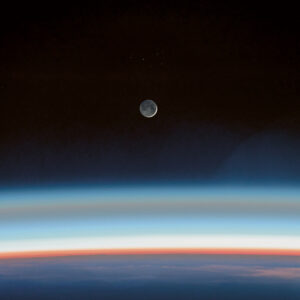
Theia
Brian Isett
- 23 min
In this week’s story, biologist Brian Isett ponders the age-old question his young daughter will inevitably ask — Where did the Moon come from? — and uncovers how the Earth got Her seasonal song. He introduces us to Theia, the proto-planet that came crashing into the surface of our infant planet four and a half billion years ago, tilting the Earth on Her axis and birthing the Moon. This meeting ultimately shaped the passing of time, the movement of tides, and the cycle of the seasons as we have known them. With the seasons now changing in response to our neglect of the Earth, Theia offers a reminder that these rhythms have always evolved through relationship.
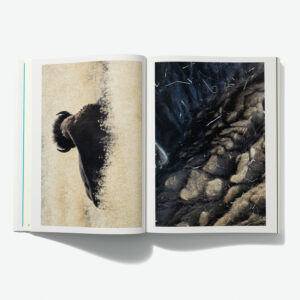
The Heart of Requiem
A Conversation with Susan Murphy Roshi, Terry Tempest Williams, and Emmanuel Vaughan-Lee
- 62 min
Sharing a depth of attention for what stands to be lost in our relationship with the seasons, Volume 6 contributors Terry Tempest Williams and Susan Murphy Roshi come together to explore the theme of requiem in this first conversation of a companion series to Seasons. Drawing on their respective essays, “A Hollow Bone” and “Alive In the Skin of a River’s Flow,” Terry and Susan contemplate what becomes present amid absence, a love for the burning world, and ways we can move with flock consciousness through this time of ecological uncertainty.
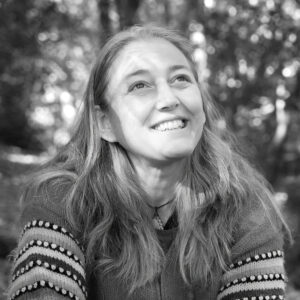
Learning to Listen to Plants
A Conversation with Monica Gagliano
- 65 min
How might our understanding of plants transform if it embraced the voices of plants themselves? In this conversation, research scientist Monica Gagliano speaks about her groundbreaking research on plant communication and cognition, informed by knowledge imparted by plants through visions, dreams, and sensations. Sharing stories of how her remarkable experiments have evolved alongside a relationship of reciprocity and trust with the plants she studies, Monica offers a model for how we can radically bridge the rigor of Western scientific methodology with the deeply human and spiritual act of listening to plants.
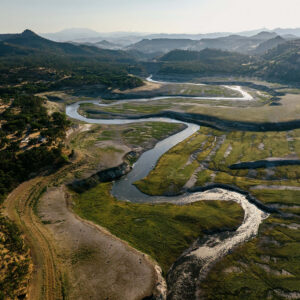
A River Reborn: Eco-Cultural Revitalization on the Klamath
Ben Goldfarb
- 41 min
Journalist Ben Goldfarb follows the winding course of the Klamath River, from Oregon’s high desert plateaus to the Pacific Ocean in Northern California, as its four most obstructive dams are dismantled under a restoration plan reopening hundreds of miles of salmon spawning habitat. Ben chronicles how the prolonged absence of salmon has reshaped this waterway, its surrounding redwood forests and canyons, and the Yurok, Karuk, Hoopa, and Shasta tribes for whom this creature is not only sustenance, but sacred kin. Tracing the monumental effort to restore the vital presence of salmon, Ben witnesses how the restitching of relationships between land, fish, and humans is nourishing this ecosystem anew.
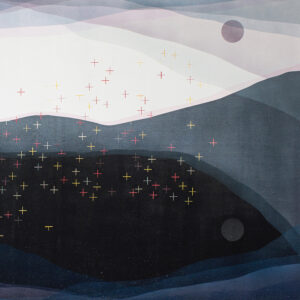
Be Earth Now
Rainer Maria Rilke recited by Joanna Macy and Anita Barrows
- 22 min
Earlier this year, the remarkable eco-philosopher Joanna Macy passed away at age ninety-six. Among her many gifts, she was a seminal translator of the great twentieth-century poet Rainer Maria Rilke. In our final episode of the year, we return to a selection of translations of Rilke from The Book of Hours: Love Poems to God, by Joanna and award-winning poet Anita Barrows, that speak to the beauty and mystery present in worlds both seen and unseen, the unknowability of the Divine, and the union of nature and the transcendent. We share them this holiday period in the hope they nourish heart and spirit, inviting reflection on all that is given and all that fades away.
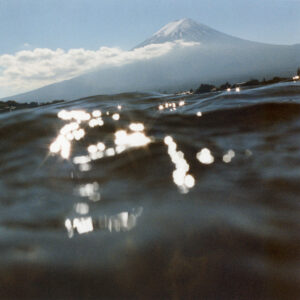
Alive in the Skin of a River’s Flow
Susan Murphy Roshi
- 32 mins
In this week’s story, Australian writer and Zen roshi Susan Murphy explores how haiku’s reflections of the seasons are being disrupted by the climate crisis. How will this poetic form bear witness to the ferocity of change reshaping the seasons? Woven with verses from Bashō, Buson, Issa, and fellow Volume 6 contributor Ron C. Moss, this story contemplates whether haiku may, in fact, be a vessel for holding the paradox of the seasons in this moment: allowing us to both mourn and love a rapidly evolving Earth.

The Substrate of Mystery: Mycelial Networks, Mutualism, and Symbiosis
A Conversation with Merlin Sheldrake
- 47 min
Fungi are veteran survivors of ecological disruption, and they demonstrate a radically different approach to crisis and decision-making than we do. While we tend to work with binaries and control when navigating uncertainty, mycelium works from a place of relationality. In this conversation, acclaimed mycologist and author Merlin Sheldrake explores what we can learn from mycelial networks about building flexible ecological, social, or structural systems that are rooted in mutuality and exchange. Tracing the ways we can embrace a mycelial way of thinking, he invites us to dwell within the “substrate of mystery” embodied by fungi: a liminal space where new ways of being can emerge.
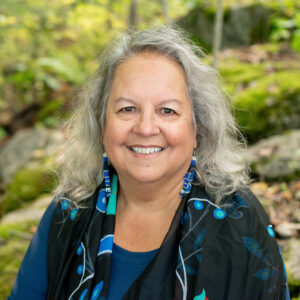
Practical Reverence
A Conversation with Robin Wall Kimmerer
- 100 min
This Thanksgiving holiday, we return to a conversation with Potawatomi botanist Robin Wall Kimmerer, where she talks about her new book The Serviceberry, which emerged from an essay she wrote for us about the potential of a gift economy to recognize the sacred nature of the Earth. Robin introduces a set of ethical and pragmatic principles, known as “the Honorable Harvest,” that orients us to take only what we need, share abundance, and offer gratitude for what is selflessly given to us; and leads us towards embodying a simple “practical reverence” for the Earth.
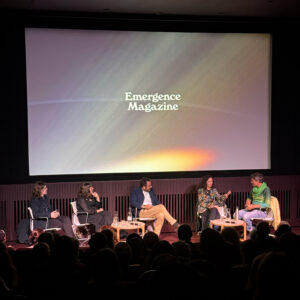
Seasons: A Conversation at the Tate Modern
With Melanie Challenger, Sam Lee, Dara McAnulty, Kerri ní Dochartaigh and Emmanuel Vaughan-Lee
- 76 min
In November, we celebrated the launch of our latest print edition, Seasons, at the Tate Modern in London. Recorded live at the event, this conversation featuring four Volume 6 contributors, delves into each of their stories and the themes of requiem, invitation, and celebration at the heart of their seasonal experiences. From honoring the fragility of spring birdsong, to finding an expanded sense of self through seasonal “noticelings,” this wide-ranging and lively exchange explores the myriad ways of remembering our relationship with the seasons.
Discover our latest print edition, Volume 6: Seasons.
Featured Episodes

When the Earth Started to Sing
by David G. Haskell
- 39 min
In this audio experience by biologist and acclaimed author David George Haskell, we are invited to be attentive to the songs and stories that thrum in the air around us. Hearing three billion years of our planet’s sound evolution—a lineage of language—in the trills, hoops, barks, bugles, clicks, and pulses of the life around him, David shares the connection to both deep time and the more-than-human world that can be found when we tune in to the Earth’s orchestra. Made entirely of the tiny trembling waves in air, the fugitive, ephemeral energy that we call sound, this experience combines human speech with other voices to immerse our senses and imaginations in the generative, provoking, and unifying power of sound.
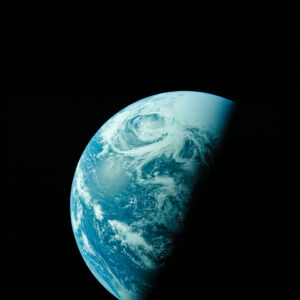
Ten Love Letters to the Earth
by Thich Nhat Hanh
- 50 min
In honor of the passing of Buddhist monk and Zen Master Thich Nhat Hanh, we republished his Ten Love Letters to the Earth, a series of meditations that engage us in intimate conversation with the living world. Here, Emergence Executive Editor Emmanuel Vaughan-Lee reads all ten letters for our podcast. Composed as a living dialogue, they are even more potent when recited. We invite you to read them aloud yourself, joining your voice to Thich Naht Hanh’s call to fall in love with the Earth.
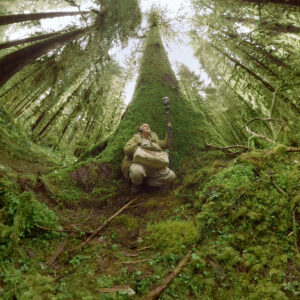
Sanctuaries of Silence: A Listening Journey
by Adam Loften & Emmanuel Vaughan-Lee
- 14 min
In this immersive listening journey from our archive, acoustic ecologist Gordon Hempton guides us into the Hoh Rain Forest—one of the quietest places in North America. In a world drowned out by the din of modern life, Hempton offers a way to attune our ears to the sounds that emerge in the absence of noise and reconnect with the silence of the living world.

Practical Reverence
A Conversation with Robin Wall Kimmerer
- 61 min
In this conversation, Potawatomi botanist Robin Wall Kimmerer celebrates the serviceberry—both as a plant of joyous generosity, and as a living model for a gift economy that recognizes the sacred nature of the Earth. Delving into her latest book, which elaborates on an essay she wrote for us in 2020, Robin speaks about how a sense of “enoughness” can radically shift our habits of consumption; and how the ethical and pragmatic principles of the Honorable Harvest can invite us to honor a currency of relationship over a currency of money, helping us embody a practical reverence for the Earth and Her abundance.
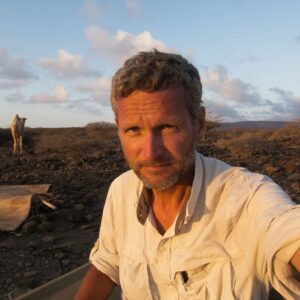
A Path Older Than Memory
A Conversation with Paul Salopek
- 41 min
In this conversation, Emmanuel Vaughan-Lee speaks with Pulitzer Prize–winning journalist Paul Salopek, who is a decade into a remarkable journey retracing, on foot, the migration pathway taken by the first humans out of Africa tens of thousands of years ago. Speaking to us from the Liaoning province in northeastern China, Paul shares how moving at three miles per hour has deepened his personal relationship to time. As he becomes attuned to what he terms “sacramental time,” the boundaries between the physical and metaphysical begin to blur into an expansive experience of timelessness.
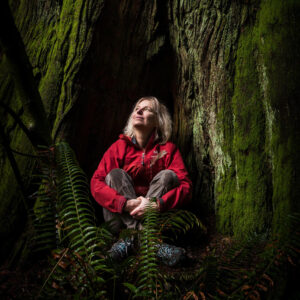
Finding the Mother Tree
A Conversation with Suzanne Simard
- 64 min
Suzanne Simard is known for her groundbreaking research on the belowground fungal networks that connect trees and facilitate inter-tree communication and interaction. We continue to explore Futures this week with another story on motherhood—this time within the world of trees. In this interview, Suzanne discusses her book Finding the Mother Tree: Discovering the Wisdom of the Forest and shares her latest research on how Mother Trees recognize and support their kin.
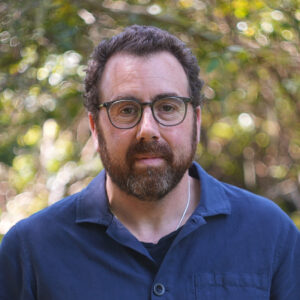
A Primordial Covenant of Relationship
An Evening in London with Emmanuel Vaughan-Lee
- 52 min
In this talk given at St. Ethelburga’s Centre for Reconciliation and Peace in London, Sufi teacher and Emergence Executive Editor Emmanuel Vaughan-Lee speaks about what it looks like to live in an unfolding apocalyptic reality and the creative possibilities that are waiting to be embodied. In this time of deep uncertainty, he reminds us of the ancient, primordial covenant of relationship with the living world that can give us a ground to stand on, and the sacred nature of creation that is always there, waiting for us to return to it.
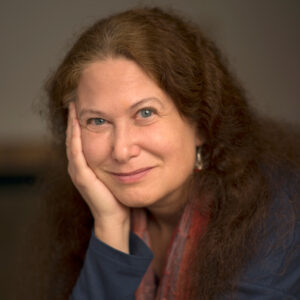
On Time, Mystery, and Kinship
A Conversation with Jane Hirshfield
- 103 min
Jane Hirshfield’s poetry is both mystical and deeply rooted in physical life, opening our eyes and hearts to what lies at the periphery—what is both ordinary and invisible amid the clamor of modern life—and reorienting us to engage from a space of wonder. In this expansive conversation, Jane recites several of her poems, including “Time Thinks of Time,” from our fifth print edition. Drawing on a lifelong relationship with Zen, she speaks about how a profoundly felt intimacy between self and world can recalibrate our ethics, helping us find both humility and an inner spaciousness that can lead us towards being in service to the Earth.

Valemon The Bear: Myth in the Age of the Anthropocene
featuring Martin Shaw
- 15 min
In an audio adaptation of our multimedia experience “Valemon the Bear: Myth in the Age of the Anthropocene,” mythologist Martin Shaw takes us on a journey to the deepest parts of ourselves. Summoning the ancient tale of a wild daughter falling in love with a bear, Martin invites us into a deep encounter with a living myth that gossips across species, drawing us back into call-and-response with the more-than-human world.
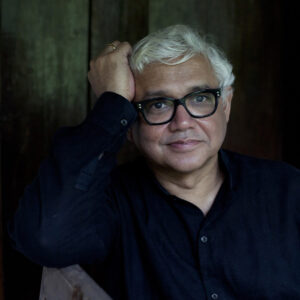
Beings Seen and Unseen
A Conversation with Amitav Ghosh
- 41 min
How can stories return us to what is essential as we navigate an uncertain future? In this conversation with Amitav Ghosh, author of The Nutmeg’s Curse: Parables for a Planet in Crisis, he calls on storytellers to lead us in the necessary work of collective reimagining—decentering human narratives and re-centering stories of the land.
Playlists & Series
